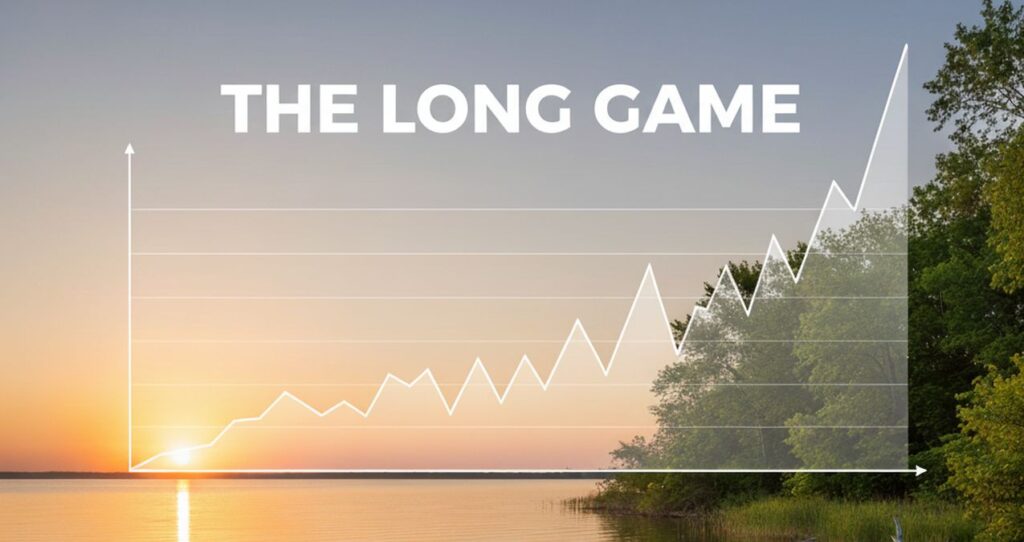If you’ve ever represented a lake home buyer in Southwest Michigan, chances are you’ve heard someone confidently declare, “Lake homes never go down in value.” It sounds reassuring, especially if you’re stretching your budget or holding onto the belief that waterfront property is untouchable. But the truth is, that assertion is a myth. Believing it can cost you thousands.
Why This Matters
I’ve seen too many buyers and sellers fall into this trap. The idea of “can’t lose” property creates false confidence, which in turn leads to poor decision-making. If you’re planning to invest in a lakefront home, it’s best to have your eyes wide open. Understanding both the strengths and risks of this market will help you to avoid costly mistakes and give you an edge in a highly competitive market.
History Speaks Volumes
The housing crash of 2006 to 2008 shattered the idea of permanent upward value. Lake homes in Southwest Michigan dropped, just like everything else. And they didn’t bounce back quickly. While U.S. residential real estate recovered its pre-crash pricing by 2013, our lakefront market didn’t return to those levels until 2018. That’s five years later.
That gap matters. It proves that the waterfront isn’t immune to value changes in the local and national market. In fact, it shows how sensitive this market can be in the short term.
Hidden Risks
So why are lake homes more vulnerable than many people think? Several factors come into play:
- Lifestyle-driven ownership. Many buyers use a lake house as a second home. When finances tighten, extra homes are often the first to be listed.
- Narrower buyer pools. Fewer people can afford a second or luxury property, which magnifies downturns.
- Unrealistic pricing. Sellers often hold onto inflated price expectations longer, creating bloated inventory that drags the market down.
These dynamics make this segment more volatile than buyers expect.
An Experienced Perspective
An experienced, local Realtor® is a valuable resource that can give you perspectives that national outlets just can’t know. When I sit with clients, I don’t just share numbers, I share context and first-hand experience. Here’s what I tell buyers about approaching this market wisely:
- View a lakefront home as a long-term lifestyle investment, not a quick flip.
- Financially plan for the long-term so you can weather downturns without panic selling.
- Budget for ongoing maintenance and taxes, knowing the market won’t always cover those costs immediately.
- Keep in mind that scarcity wins over decades, even if cycles cut into value for a few years.
When you balance those realities, you avoid the traps that cause so many regrets.
The Long-Term View
Here’s the good news: if you zoom out, the lakefront market trajectory is strong. Over 10, 15, or 20 years, the value of lakefront property has historically trended upward. That’s because of simple scarcity. They aren’t making more lakefront. Lifestyle demand remains steady, with families dreaming about summers at the water’s edge.
Think of lake property like a blue-chip stock. It compounds in value and enjoyment over time. But if you treat it like an ATM that can never lose, you set yourself up for disappointment and failure.
Local Lens
Let’s talk about what’s happening right here in Southwest Michigan. Inventory remains tight, especially for true lakefront. Seasonal swings create opportunity, with spring listings attracting competitive attention and late summer or fall presenting quieter windows for patient buyers. Late season is for serious buyers taking advantage of the waning demand.
Waterfront homes continue to command a premium, but that premium is most secure for buyers who plan to stay long-term. If your timeline is only two or three years, you may not capture the appreciation you’re banking on. I’ve seen buyers who timed it well ride waves of value, and others who tried to rush the market find themselves frustrated. That’s why I stress patience as much as location.
Buyer’s Question: Do Lake Homes Always Appreciate?
The short answer is no. They don’t always go up in the short run. But over the long run, they’re among the most resilient real estate investments you can make.
When you buy with both eyes open, aware of cycles, costs, and timelines, you put yourself in a position to enjoy not just the investment, but the lifestyle that drew you to the water in the first place.
What Buyers Ask Me About Lake Home Value Appreciation
Do lake homes lose value in recessions?
Yes. History shows they do. Lake homes can dip more sharply than primary residences during downturns because they’re considered discretionary.
Is buying a lake home a bad idea if I might move in five years?
Not necessarily, but it’s riskier. If you sell in a down cycle, you may not recoup what you paid. A 10+ year horizon is much safer.
Are lake homes harder to finance?
They can be. Lenders view second homes differently, often requiring higher down payments. That’s another reason to plan carefully before stretching too far. We always recommend using a local lender familiar with the in’s and out’s of the lakefront market in Southwest Michigan.
What drives the value of a lake home the most?
Scarcity and location. True waterfront is always in demand. Condition and maintenance also play a big role in preserving long-term value.
Ready for Smarter Buying?
If you’re thinking about a lake home, don’t fall for the myth of guaranteed appreciation. The market rewards buyers who approach with realism and patience. If you’d like a clear plan tailored to your goals, I’d love to help you map it out. Start your conversation with us today.

